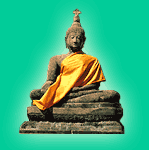Comparative Religions; Final Essay
First, let me say how much I appreciated Rev. Kythera Ann's excellent efforts to put this course together and how much I enjoyed studying with her. This Comparative Religions course was one of the most comprehensive I've ever seen and it was organized in a most logical and exemplary manner. I would definitely take other courses form the Rev. Kythera Ann.
As to how these discourses could be improved, I wouldn't know but I think if something is this good it might as well be left as it is.
What I liked about this Comparative Religion course was the organization of the material, the many excellent illustrations and pictures provided, the clear explanations given on the history, religious anthropology, customs, rituals of the various and several religions both major and minor. I also liked the suggestions for further reading and study and the many excellent and comprehensive references provided at the end of each session.
What I gain form this course:
First, of course I gained important information on the variety of religious experiences within the human family. But more importantly I gained a tremendous insight into the nature of human "soul", or, if you prefer, human nature. To explain this insight let me first quote the statement made by the Venerable Walpola Rahula, who, on the occasion of the World Buddhist Council meeting in Sri Lanka in 1966 made the following statement:
• The Buddha is our only Master
• We take refuge in the Buddha, the Dhamma and the Sangha (see Three Jewels)
• We do not believe that this world is created and ruled by a God
• We consider that the purpose of life is to develop compassion for all living beings without discrimination and to work for their good, happiness, and peace; and to develop wisdom leading to the realization of Ultimate Truth
• We accept the Four Noble Truths, namely Dukkha, the Arising of Dukkha, the Cessation of Dukkha, and the Path leading to the Cessation of Dukkha; and the law of cause and effect (Pratitya-samutpada)
• All conditioned things (samskaara) are impermanent (anitya) and dukkha, and that all conditioned and unconditioned things (dharma) are without self (anaatma).
• We accept the Thirty-seven Qualities conducive to Enlightenment (bodhipak sa-dharma) as different aspects of the Path taught by the Buddha leading to Enlightenment.
• There are three ways of attaining bodhi or Enlightenment: namely as a disciple (sraavaka), as a Pratyeka-Buddha and as a Samyak-sam-Buddha (perfectly and Fully Enlightened Buddha). We accept it as the highest, noblest, and most heroic to follow the career of a Bodhisattva and to become a Samyak-sam-Buddha in order to save others.
• We admit that in different countries there are differences regarding Buddhist beliefs and practices. These external forms and expressions should not be confused with the essential teachings of the Buddha.
I checked out the acceptance of the above statement especially with regards to point #3 with several Buddhist monks I personally know (Sri Lankan, Chinese, Japanese, and Vietnamese) and they all agreed with Rahula's assessment of the interpretation of the Buddha's teachings.
Yet, at the same time, aside form the Buddha's followers most other religions indicate that mankind desperately needs and seeks God or at least some form higher Power. Even if belief in God is only a belief, or sometimes an intuitive knowing, feeling or understanding) and even if God's existence can not be proven scientifically, a large portion of mankind (probably up to 90%) believes in something greater then themselves may that something be called God, Higher Power, Supreme Being, The Great Spirit and so on.
In summary, if there wasn't a "God" (or if God didn't exist) we would need to invent one, for it is in human nature to wanting to turn to something higher then ourselves at times of adversity, intense difficulty, danger, disease, calamity and predicament. Mankind (most of us anyway) needs someone higher then himself to pray to and to find solace in.
As for the statement by the the great Buddhist scholar Rahula that "We do not believe that this world is created and ruled by a God" I can only quote my Master's admonition "Man wants to measure the Ocean of Truth with the cup of his mind"
Rev. Peter A. Somogyi
*******************************
The Universal Life Church is a comprehensive online seminary where we have classes in Christianity, Wicca, Paganism, two courses in Metaphysics and much more. I have been a proud member of the ULC for many years and the Seminary since its inception.
The Universal Life Church offers handfasting ceremonies, funeral ceremonies and free minister training.
As a long time member of ULC, Rev. Long created the seminary site to help train our ministers. We also have a huge selection of Universal Life Church minister supplies. Since being ordained with the Universal Life Church for so many years and it's Seminary since the beginning, I've watch the huge change and growth that has continued to happen.
Try our new free toolbar at: ULC Toolbar







No comments:
Post a Comment